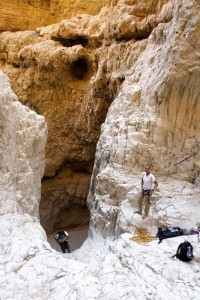Suspended from a static repel line, I lowered myself over the lip of the last of a half dozen dry water falls, this one the tallest at sixty meters. It had been a while since I had been on rope, most of my interactions with rock as a boulderer and less than ten meters off the deck. But what made this excursion with my new friend Haim and his uncle Daniel unique is we were below sea level, by a few hundred meters, baking in what must have been more than 35 degrees Centigrade in the Middle Eastern sun.
The Dead Sea lay but a few kilometers to the front of the opening of this drainage system, just one slot West from Masada, where in 66 A.D. the first Jewish-Roman war took place. The Romans built a massive ramp in order to overtake the defenses, to recapture what is believed to have been a fortress built by Herod the Great.
I feel fortunate, lucky to have met such an amazing young man in the climbing gym. Haim is fluent in French, Hebrew, English and Japanese. He is now studying at Hebrew University for his Masters in Philosophy. But climbers are like that, open, accepting, not shy. They welcome complete strangers into their homes to “crash” for the night. It’s part of the culture that I do my best to uphold in return.
At Wednesday night volleyball and potluck, here on Mount of Olives, some of the volunteers and humanitarian aid workers spoke of times when they were walking home from class or work, on either the Israeli or Palestinian side of Jerusalem, and were invited into the home of a stranger for tea, coffee, even dinner. Sometimes old women would come out to meet them on the sidewalk and press bread and cheese into their hands, telling them they didn’t look like they had enough to eat.
My former employee and friend Amjad, who now lives in Dubai, recently spoke to me of the ancient times when the homes of desert dwellers had guest rooms always available for strangers. It was then customary, and in some places remains so, that at any time of the day or night a traveler could knock on the door and ask for shelter. There was perhaps less fear of the unknown then, of the stranger. Despite all the advances in technology, science, and knowledge, we are in some ways more afraid than ever before.
In those ancient days, when the world was the distance one could walk or sail in a few days, people had to embrace an interconnected life if they were to survive. Facebook, Google+, Skype, social networking will never replace the very basic interaction of two people meeting, face to face for the first time, the visceral exchange of words, body language, and pheromones engaging all our senses.
In this way, I was not surprised (but very pleased) when Haim invited me to an all-day canyoneering adventure with him and his uncle. This is what climbers do, everywhere in the world. But in this place of political and religious tension, where the throwing of stones is met with tear gas, helicopters, and machine gun fire, there is an extra emphasis on the trust, some would say the faith required to invite a complete stranger into your home.
We walked the broken limestone trail back to Haim’s grandmother’s Mazda which Daniel, her son drove and returned to Haim’s home. We unpacked the car, fed the dog, and then headed down into the Wadi Qelt valley which connects Jerusalem to Jericho through the Judean desert in the West Bank.
At first, I was reluctant to venture out into sun again, surprised by the apparent distance we had to drop and later return. But I trusted Haim and Daniel to treat me well, and as promised, it was more than worth the effort. A very real oasis greeted us at the bottom of the hot, dusty trail. We removed our shirts and shoes, waited for the visitors to thin, and then enjoyed the cool water in two pools, one with a substantial water fall. Small fish nibbled on legs and toes, if we sat still long enough.
It was a day without discussion of politics or religion. It was a day in which three people simply came together to enjoy the outdoors. On this day, I am grateful for new friends, who invited me to join their adventure in an ancient place, high above the Dead Sea yet far below the Mediterranean and oceans of the world.









